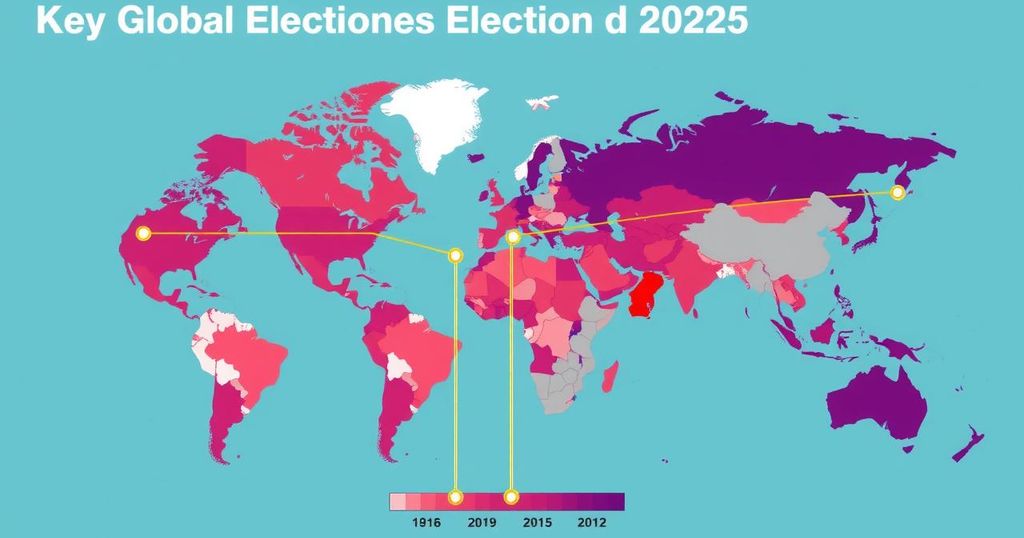World news
ALEH HAIDUKEVICH, ASIA, BELARUS, CANADA, EAST, EUROPE, EUROPEAN UNION, FOREIGN POLICY, HANNA KANAPATSKAYA, LITHUANIA, NORTH AMERICA, PHILIPPINES, POLITICS, PRESIDENTIAL ELECTION, PRESIDENTIAL ELECTIONS, REPUBLICAN PARTY OF LABOR AND JUSTICE, SCHOOL OF INTERDISCIPLINARY GLOBAL STUDIES, SIARHEI SYRANKOU, TA, TATSIANA KULAKEVICH, UNIVERSITY OF SOUTH, UNIVERSITY OF SOUTH FLORIDA
Daniel O'Connor
0 Comments
Five Significant Global Elections to Monitor in 2025
The article discusses five significant global elections in 2025: Belarus’s repressive environment under Lukashenko, Germany’s snap election amid political turmoil, the Philippine senate elections reflecting presidential power, Canada’s looming elections due to Trudeau’s declining support, and Chile’s presidential contest amidst opposition gains. Each election echoes themes of political stability and economic management.
As the world approaches 2025, several significant elections are on the horizon, poised to shape the political landscape in key countries. While the year may not resemble the numerous elections of 2024, it will still witness crucial votes influenced by major issues such as inflation, the populist right, and geopolitical conflicts. Experts have highlighted five countries to watch: Belarus, Germany, the Philippines, Canada, and Chile.
In Belarus, Alexander Lukashenko prepares for his seventh term amidst a climate of repression and absence of genuine opposition. With the current regime suppressing dissent since the controversial 2020 elections, forecasts indicate that Lukashenko is likely to win again, further aligning Belarus with Russian military interests.
Germany’s political turmoil has precipitated a snap federal election on February 23, 2025, following the collapse of Chancellor Olaf Scholz’s coalition government. With the economy struggling under global pressures and rising populism, the election results could see a shift in Germany’s political dynamics, with potential leadership changes on the horizon.
Philippine elections on May 12, 2025, will see voters select local officials and senators. The results are expected to reflect the incumbent president’s grip over political machinery, potentially impacting the future of Vice President Sara Duterte amid internal power struggles.
In Canada, Prime Minister Justin Trudeau faces an increasingly precarious situation ahead of a likely early election before October 20, 2025. Trapped between popular discontent over inflation and political rivalries, Trudeau’s future leadership remains uncertain, with rising threats from Conservative challenger Pierre Poilievre.
Finally, Chile’s presidential elections are scheduled for November 16, 2025. With President Gabriel Boric unable to run for reelection, the opposition appears to be gaining ground. However, previous displays of electoral volatility suggest that an outright victory for either side is far from guaranteed.
Each of these elections will be marked by unique challenges and the overarching themes of political stability and economic management, making them pivotal in understanding future global trends.
The article examines five key elections around the world set for 2025, emphasizing their potential impact on global political dynamics. The focus on countries like Belarus, Germany, the Philippines, Canada, and Chile highlights the varying circumstances each nation faces, including economic struggles, political repression, and the influence of populist movements. The insights provided by experts associated with these nations shed light on the stakes involved, illustrating how local issues resonate with broader global themes.
In summary, the upcoming elections in Belarus, Germany, the Philippines, Canada, and Chile will be crucial in shaping the political landscapes of these nations. Each election reflects distinct challenges, from authoritarian rule and economic turmoil to internal power disputes and potential ideological shifts. Observers should closely monitor these events as the outcomes hold significant implications not only domestically but for international relations and global trends in governance.
Original Source: www.ndtv.com




Post Comment